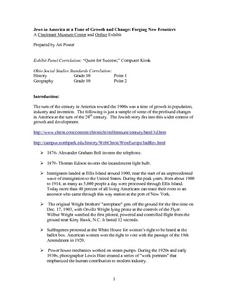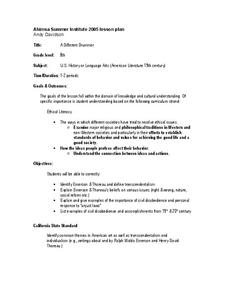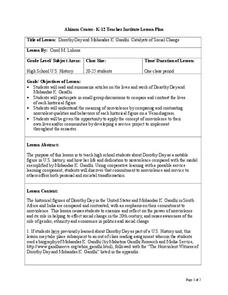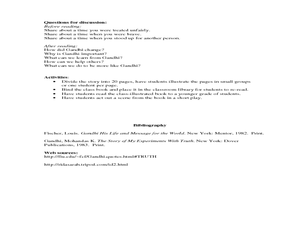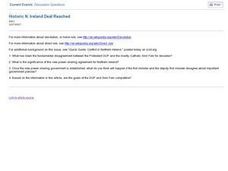Curated OER
A Comparison of Two Great Leaders: Mahatma Gandhi and Martin Luther King Jr.
Students explore these two leaders use of nonviolent protest techniques. They read about the life of King Jr. They view a slide show about the life of Gandhi. Compare/contrast the lives of these two men using a Venn diagram.
Curated OER
Nonviolence as a Tool for Change Lesson 2
Students explore nonviolent protest. In this Civil Rights lesson, students read the essay "Nonviolence and Racial Justice." Students present the information they gleaned from the essay to their classmates in order to consider how...
Curated OER
Globalization Comes to the Table
Students, in groups, research the issues surrounding one of several controversies involving food and globalization. Then they debate their position and show a PowerPoint presentation at a mock summit meeting.
Curated OER
Reformers versus Residents in Five Points: A Role Play
Social Studies and role-playing can go hand in hand. Learners use supporting evidence found in primary and secondary source material to develop a character from the Five Points neighborhood in the 1850s. Each student takes on the role of...
Curated OER
Unit on Gandhi and Ahimsa
Students explore the history of Gandhi and his viewpoint and example of nonviolence. In this World History lesson plan, students complete numerous research assignments and activities over the course of nine lessons to expand their...
Curated OER
Jews in America at the Time of Growth and Change: Forging New Frontiers
Tenth graders examine the role of Jewish Americans in the 1900s. They examing the changes in industry and inventions. They also identify how Jewish Americans changed society and religious organization.
Curated OER
GANDHI'S INDIA
Young scholars describe key events in the life of Gandhi. They determine why knowledge of geography is necessary to understand the history of the people in a place or region. They write a summary of how the events in Gandhi's life,...
Curated OER
Nonviolent Leaders
Students compare the life of Gandhi and other nonviolent leaders. They identify qualities and behaviors of nonviolence. They synthesize the information they research about world leaders and the impact they had.
Facing History and Ourselves
Eyes on the Prize Lesson 1: The Philosophy of Nonviolence
High schoolers explore the concept of nonviolent demonstration. For this Civil Rights Movement activity, students investigate examples of injustice and discuss the philosophy of nonviolence fueled by leaders of the movement. High...
Curated OER
A Different Drummer
Eighth graders investigate philosophy and meditation techniques by discussing Emerson and Thoreau. In this philosophical traditions lesson, 8th graders identify the men Ralph Waldo Emerson and Henry David Thoreau, their work, and their...
Curated OER
Free India: Resisting British Rule in India
Students explore the impact of nonviolence during Gandhi's Free India movement. In this World History instructional activity, students complete several activities including research, class discussions and a multimedia project, all...
Curated OER
Dorothy Day and Mohandas K. Gandhi: Catalysts of Social Change
Students explore how Dorothy Day and Mohandas Gandhi were leaders for social change. For this history lesson, students analyze the impact of these two leaders through several activities and group assignments.
Curated OER
The Roots of Ahimsa
Students investigate the philosophy of nonviolence. In this Ghandi activity, students discover that Gandhi inspired many civil rights leaders with the idea of ahimsa. Students complete venn diagrams, create timelines, and discuss reading...
Curated OER
Non-Violence Means "Doing Nothing"
Students reflect on violence and non-violence. In this World History lesson, students read an article by Gandhi then write an essay as to whether they agree or disagree with his thoughts. Students then share all their ideas as a class.
Curated OER
Mohandas Gandhi: Changing the World One Step at a Time
Students illustrate pages of a book. For this famous historical icon lesson, students are read a story about Mohandas Gandhi, illustrate the pages in small groups, assemble a class book to read to younger students, and act out a scene...
Curated OER
Truth and love by Ghandi and King: Experimenting with Satyagraha
Young scholars research Ghandi's philosophy of Satyagraha. In this Satyagraha lesson, students see how Martin Luther King incorporated Ghandi's "truth-force" philosophy into the Black Freedom Movement. They see how this philosophy is...
Curated OER
Religion in Social Change: What's God Got To Do With It?
Students determine how religion influences social change. In this religion and social change activity, students examine how the religious beliefs of Mohandas Gandhi and Martin Luther King, Jr. were inspirational as they worked to reduce...
Curated OER
Historic N. Ireland Deal Reached
Four questions about conflict in Northern Ireland make up this activity, which prompts students to go to Wikipedia for more background on the situation. The questions are good and can prompt strong discussions in your class. But,...
K20 LEARN
The Tulsa Race Massacre
The 1921 Tulsa Race Massacre is the focus of a lesson that explores the causes and consequences of the destruction of the Greenwood section of Tulsa, Oklahoma. Pupils examine primary source images, a video clip covering the riots, and...
Smithsonian Institution
Strength in Solidarity: Coalition of Immokalee Workers and the Campaign for Fair Food
Not all food is created equal. The lesson dives into the world of migrant farm workers to show their struggles to earn livable wages and better working conditions. Academics learn why the Coalition of Immokalee Workers was created and...
Curated OER
Nonviolence as a Tool for Change Lesson 1
Students examine voting rights in the South during the 1950s and 1960s. For this civil rights lesson, students examine legal rights and the opportunity to cast votes. Students research primary documents regarding the topic and share...
Curated OER
The March from Selma to Montgomery
Students examine voter discrimination. In this Civil Rights lesson, students watch segments of "Eyes on the Prize" and discuss the organization of the march from Selma to Montgomery. Students conduct interviews to learn personal stories...
Curated OER
Considering Media And Meanings
Young scholars study reproductions of prints or murals. They interpret artworks supporting their conclusions with evidence in work and from contextual information. They focus especially on significance of artist's choice of mural or...
Curated OER
School Day: South Africa
Students explore a student protest in South Africa. They observe a film about life in South Africa. Students consider how the image of South Africa is shaped by the media. Students roleplay interviewing African children.







